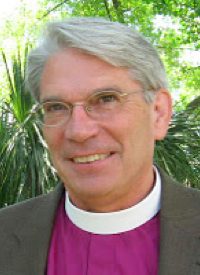
Bishop Lawrence is one of the few significant clergyman left in that church since its drift toward “politically correct” theology beginning in the 1960s. Many former Episcopalians, both parishioners and clergy, have broken away. They adopted the “Affirmation of St. Louis” in September 1977, which affirmed the historic and immutable nature of Christian doctrine. Among the principles acknowledged to be part of that doctrine were the sanctity of human life at the time of conception and human sexuality is only moral when it's between a man and a woman in marriage.
Bishop Lawrence chose to stay with the church into which he had been brought, even though that church was now pronouncing that abortion was acceptable in a broad number of cases, that homosexuality was an acceptable human relationship, and that clergy need not be male, or even heterosexual. He continued to preach what his parishioners believed — what his church formerly espoused — despite the fact that these were in conflict with those who now ran the Episcopal Church.
In October, the national church accused Bishop Lawrence of rejecting the teaching of the church, but the Right Reverend Dorsey Henderson, Jr., president of the Disciplinary Board for Bishops, has just tentatively found the bishop not to merit censure. Henderson put it this way: "Bishop Lawrence has repeatedly stated that he does not intend to lead the diocese out of the Episcopal Church -— that he only seeks a safe place within the church to live the Christian faith as that diocese perceives it. I presently take the bishop at his word."
This followed about a week after a decision by the Georgia Supreme Court, brought by the national church against Bishop Lawrence and his vestrymen, that determined that the historic Christ Church in Savannah belongs to the national church and not to the rector, vestry, and congregants of the Christ Church itself. Bishop Lawrence and his flock seemed to be considering placing themselves under the Anglican Diocese of Uganda (Anglicanism is the British predecessor of Episcopalism, and many of the once-colonial Anglican churches and dioceses, particularly in Africa, have adhered more closely to historic beliefs of the church and not “grown,” as some would put it.)
Bishop Lawrence on November 29 published a letter stating that the decision of this disciplinary board:
I received a phone call from Bishop Dorsey Henderson, President of the Disciplinary Board for Bishops, regarding their ruling on my case which has been before them for several months. In a conference of the board members on November 22nd the Disciplinary Board was unable to certify that I had abandoned the Episcopal Church. While the statement [of the Disciplinary Board] leaves many questions unanswered — frankly, to my mind it appears to read like a complex state of a complex decision in a complex time of a complex church. Nevertheless, I believe it is best to take it at face value…. For now given no more allegations for anonymous sources within the diocese it is my hope we can all get back to focusing our full attention on proclaiming the Good News of Jesus Christ.
What, really, was Bishop Lawrence’s offense? Aside from anonymous complaints, he has quite openly pronounced that the national church is preaching a "false gospel of indiscriminate inclusivity … that has suffocated the mission of the Church." This did not mean, of course, preaching hatred of homosexuals or hatred of women who have had abortions. It would mean, quite emphatically the opposite: Bishop Lawrence would preach boundless, liberating love for the homosexual and love for the women who had let her unborn child be killed.
The giant churches built by the good works of Episcopalians many decades ago have been hijacked, like many other denominations, by men and women who believe that they can change divine notions of sin to fit the chic notions of today. The struggles that clergy and parishioners faithful to the traditional teachings of the Episcopal or Anglican churches have been genuine crosses to bear. My own church met, not too many years ago, for Mass in a Seventh Day Adventist Church after our rector and his wife, on a shoestring and a prayer, endured formal censure from the church they once loved.
The letter of Bishop Lawrence, touchingly, says: “I must also give thanks for Christians in various denominations who have read of our situation in the diocese and offered prayers to God for our strength and steadfastness.” I know, for a fact, that there are Orthodox Jews who also offer unspoken but sincere supplications for help to those Christians who defend those social moral values which are rooted in the Torah and which, since we last heard from Moses, have never been repealed.
Photo: The Right Reverend Mark J. Lawrence



